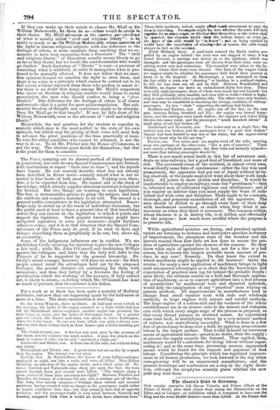The Times, carrying out its shrewd method of doing business
in journalism, has sent its own Special Commissioner into Ireland, with instructions to report "from time to time "• and his reports have begun. He can scarcely describe what has not already been described in divers tours—scarcely record what is not re- corded in blue books of bulk most infinite. Nothing new, there- fore, is to be expected from him. He cannot add to the stock of knowledge, which already supplies abundant materials to legislate for Ireland. But two things are wanting to such legislation. The first is statesmanlike genius to grasp the subject, and bend the stubborn and complex materials to its will. The second is a general public concurrence in the legislation attempted. Know- ledge may be stored up at the reach of individual statesmen, but the public need at least to have a general idea of that knowledge nefore they can concur in the legislation to which it points and Support the legislator. Such popular knowledge might have mitigated opposition to some past measures—might facilitate others to come ; and it is in that direction that the Special Com- missioner of the Times may do good, if he stick to facts and things; describing them as graphically as he can, but, above all, as accurately. Some of the indigenous influences are in conflict. We see Archbishop Crony avowing his intention to give the new Colleges a fair trial ; while Mr. John O'Connell sets Archbishop WHale against his colleague, and hints that the laity will defer to the Primate if he be supported by the general hierarchy. Dr. Crolly's moral courage, however, will have its reward: the Irish people cannot resist the advantages held out by the proposed Colleges; the several districts are contending for them with animation ; and thus they betray by a foretaste the feeling of gratification which the working of the measure, if duly carried out, is likely to create,—a feeling which Mr. O'Connell has done so much to prevent, that its existence is his defeat.


























 Previous page
Previous page